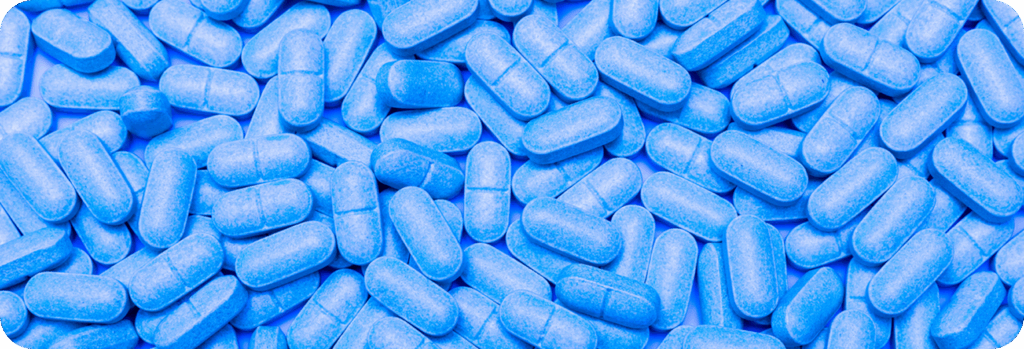Background
& History of Use
Potential Health & Longevity Benefits
Research & Studies

Neurometabolic mechanisms for memory enhancement and neuroprotection of Methylene Blue – PMC
What the evidence suggests: This review paper provides evidence that low doses of Methylene Blue selectively accumulate in mitochondria and enhance electron transport chain efficiency by bypassing damaged proteins in the mitochondria’s energy generating machinery, which improves cellular energy (ATP) production. Preclinical models show potential improvements in memory, learning, and resilience to neurodegeneration, suggesting potential for neuroprotection in contexts of aging, injury, and stress. Together with clinical studies demonstrating improvements in cognitive function, the evidence may suggest a fundamental neuroprotective role of Methylene Blue for slowing brain aging.

What the evidence suggests: A post-hoc analysis of a Phase III clinical trial found that low doses of Methylene Blue significantly slowed cognitive decline and brain atrophy in individuals with mild Alzheimer’s disease, comparable to the rate of decline in individuals without disease. This was accompanied by observations of improved brain blood flow and metabolism. The trial design and statistical analysis for this study has been challenged, but preliminary results suggest that Methylene Blue may slow age-related cognitive decline in individuals with neurodegenerative disease and further studies are warranted.

Clinical effectiveness and prospects of Methylene Blue: A systematic review
What the evidence suggests: This systematic review of clinical trials supports the broad therapeutic profile of Methylene Blue, including benefits in recovery from brain injury, infectious disease, toxin exposure, and ischemic injury. Also trials suggesting it may slow cognitive decline in individuals with neurodegenerative disease. This review paper gathers evidence from diverse clinical contexts supporting Methylene Blue’s neuroprotective and cellular resilience-enhancing properties, but more robust studies are needed to explore its benefits for combatting age-related neurodegeneration.

From Mitochondrial Function to Neuroprotection – An Emerging Role for Methylene Blue – PMC
What the evidence suggests: Preclinical evidence suggests Methylene Blue may support mitochondrial function, reduce oxidative stress, and restore metabolic health in models of neurodegenerative disease and brain injury. This review of the preclinical literature offers promising evidence that Methylene Blue targets cellular mechanisms with broad neuroprotective effects. More human clinical trials are needed to validate its translational potential.

What the evidence suggests: A double-blind, placebo-controlled, randomized trial found that a single low dose of Methylene Blue enhanced brain activity during cognitive tasks and improved memory performance in a small group of healthy adults. This suggests that Methylene Blue may enhance focus and memory in generally healthy individuals. This study demonstrates Methylene Blue’s rapid cognitive enhancing effects, highlighting its role as a potent nootropic.

What the evidence suggests: Post-hoc analysis of trial data from a Methylene Blue Alzheimer’s trial shows that low plasma concentrations of Methylene Blue are potentially linked to greater benefits in reducing brain atrophy and slowing cognitive decline than higher plasma concentrations. It is important to note that although the initial clinical trial failed to reach it’s primary outcome, this may be due to the dosing schema. Future clinical trials with lower doses of Methylene Blue are warranted to validate its potential neuroprotective benefits.

Striatal Neuroprotection with Methylene Blue
What the evidence suggests: Methylene Blue preserved motor function, metabolism, and brain volume in a rotenone-induced mouse model of Parkinson’s disease. Another piece of evidence warranting clinical studies on Methylene Blue’s potential neuroprotective effects against toxic exposures and stress that drives neurodegeneration and cognitive decline.

What the evidence suggests: A randomized controlled trial in elderly surgical patients showed that Methylene Blue reduced the incidence of early postoperative cognitive dysfunction, likely via reduction of oxidative stress, inflammation, and vascular dysfunction. Larger studies are warranted to explore Methylene Blue’s potential neuroprotective effects, especially in the context of brain injury and stress.

What the evidence suggests: Review paper evaluating clinical and preclinical data that supports Methylene Blue as a top 5 gerotherapeutic candidate based on standardized criteria evaluating available data on the lifespan and healthspan enhancing effects of dozens of longevity drug candidates, including rapamycin, metformin, acarbose, and SGL2i’s. AgelessRx is exploring its potential effects on healthy longevity further in the X-prize Healthspan competition for reversing functional aging of the immune system, muscle, and brain.
Most studies were small and/or short-term (less than 12 months), utilizing high doses of Methylene Blue. There are still no definitive clinical trials demonstrating low dose Methylene Blue reduces the incidence of neurodegenerative disease in humans. Those clinical trials that do show slower cognitive decline in individuals with Alzheimer’s must be interpreted with caution due to study design limitations.
Mitochondrial Function & Brain Health

Our brain represents 2% of our body weight, but uses 20% of our body’s energy.
What this means: When our brain runs low on energy, cognitive performance is impaired.

Mitochondria, our cellular batteries, naturally decline beginning in our 30s.
What this means: Mitochondria are tasked with producing cellular energy (known as ATP) which is used to support all the essential functions our brain cells need for survival, healthy cognitive function and aging. Mitochondrial dysfunction is one of the root drivers of brain aging and cognitive decline.

Methylene Blue accumulates in damaged mitochondria of metabolically active organs like the brain. Methylene Blue bypasses damaged components of mitochondrial energy generation machinery and restores cellular energy production.
What this means: Methylene Blue may be able to slow age-related cognitive decline and neurodegeneration by restoring cellular energy production in old and damaged mitochondria.

How it works
- Targets the most metabolically active regions of our body, particularly regions of the brain.
- Enters mitochondria and bypasses damaged components, enhances activity of final gear in ETC to restore ATP production.
- Acts like a jump-starter for mitochondrial energy.
- Accumulates where oxidative stress is highest to promote recovery.

FROM THE LAB TO YOU
Emerging potential in neuroprotection
- Methylene Blue’s use slowed in the mid-1900s due to newer, stronger medications for treating viruses and depression.
- Preclinical data shows Methylene Blue improves mitochondrial function and reduces oxidative stress, two major drivers of cognitive decline and neurodegenerative disease.
- Clinical trials show Methylene Blue may slow cognitive decline.


Explore Methylene Blue
- May improve memory, focus, mental clarity, and overall cognitive function
- May enhance mitochondrial energy
- May stifle inflammation in the brain that contributes to brain fog
- May protect against oxidative stress and free radical damage
- May slow age-related cognitive decline and neurodegenerative diseases like Alzheimer’s

Starting at $43/mo
FAQs
How do you take Methylene Blue?
Methylene Blue capsules are taken by mouth with a full glass of water. For the best results, take Methylene Blue in the morning at around the same time. You can take Methylene Blue with or without food, but taking your dose after breakfast may help minimize the risk of gastrointestinal side effects.
Will Methylene Blue capsules stain my teeth?
Nope! Unlike Methylene Blue drops, capsules protect your teeth from discoloration. However, you should still expect the medication to turn your urine blue, which is a known and harmless side effect.
When encapsulated, the Methylene Blue solution doesn’t come into direct contact with your teeth, tongue, cheeks, or any part of your mouth—it’s swallowed whole so it can be more easily absorbed.
But capsules only protect from discoloration if they remain intact. If you break the capsule, the medication will likely stain anything it comes into contact with. Avoid chewing or separating your Methylene Blue capsules.
I broke my Methylene Blue capsules, how do I remove the stain?
If you chewed your capsule and it stained your mouth, tongue, or teeth, try swishing your mouth with lemon juice or vinegar water for 30 seconds, then rinsing. Repeat this step several times if necessary. You should also stay hydrated and drink as much water as possible.
If Methylene Blue stains your skin or clothes, try scrubbing with the same lemon juice or vinegar water solution, or using a full-strength, skin-safe detergent. You can remove Methylene Blue from objects or surfaces with most commercial stain removers. Please note that there is no reliable method to reduce the appearance of blue urine after taking Methylene Blue. In most cases, urine will not clear until 2-6 hours after your last dose¹⁵, or up to 24 hours.
See all FAQsImportant safety information and common side effects
Most common side effects
One of the most common side effects of Methylene Blue is blue urine, which is a normal reaction and not cause for alarm. Feces, saliva, and sweat may also be temporarily discolored with a blue tint. Most patients clear the medication from their system within 4-6 hours, or up to 24 hours.
Some patients may also experience sun or UV sensitivity while taking Methylene Blue. Be cautious when spending time in the sun, even artificial sunlight, and go inside if necessary.
Other common side effects include nausea, vomiting, stomach pain, diarrhea, loss of appetite, anxiety, and urinary irritation.
Most side effects are mild and go away on their own within a week or two. Taking Methylene Blue with a full glass of water and a meal may help minimize the chances of side effects.
Other important safety information
Methylene Blue should not be used by anyone with a history of G6PD deficiency, or anyone who has or has had renal dysfunction.
Do not use Methylene Blue if you are currently taking a medication that affects serotonin, such as antidepressants like SSRIs and MAOIs, or SARIs like Trazodone.
Do not use Methylene Blue if you are pregnant or breastfeeding, or plan to become pregnant or breastfeed while taking Methylene Blue.
Though rare, allergic reactions to Methylene Blue are still possible. If you notice any shortness of breath or swelling around your face, tongue, or throat after using Methylene Blue, stop use and contact emergency services right away.
As with any prescription medication, the dose prescribed is for you and you alone. Do not, under any circumstances, share or allow anyone else to use your Methylene Blue prescription.
Note: This product alone is not intended to diagnose, treat, cure, or prevent any disease. Please consult a medical professional to determine whether or not Methylene Blue is right for you.














